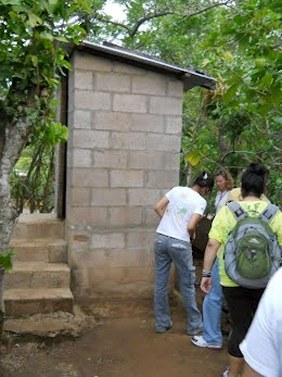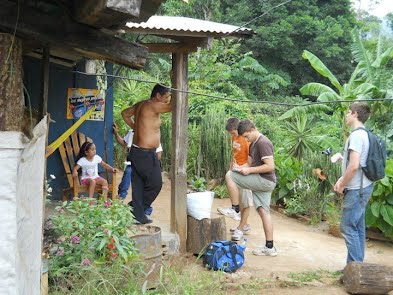International Project: El SalvadorEngineers Without Borders is an international organization, based in Colorado, with student and professional chapters primarily around the US. The mission of EWB is to support community-driven development programs worldwide by collaborating with local partners to design and implement sustainable engineering projects, while creating transformative experiences and responsible leaders.
The Michigan State University chapter strives to achieve this goal with our international project in El Balsamar, El Salvador. In El Salvador, MSU students will work with a professial engineer mentor and a community of approximately 600 people to improve sanitation conditions, specifically focusing on designing and constructing composting latrines. An EWB MSU project since summer 2010, MSU-EWB has begun travel to El Salvador, as of Summer 2012, and will continue to build a relationship for the next five years at the minimum. |
If you'd like to contribute towards our efforts in El Salvador, please visit our donation page.
Improving Sanitation

EWB-MSU inspecting existing latrines in El Balsamar.
The community of El Balsamar currently suffers from health-related issues that may be attributed to improper sanitation. While some families in the community have the privilege of having composting latrines, most either have pit latrines or no latrines at all. Due to the fact that pit latrines lack a drying agent, families become more susceptible to diseases carried by flies, a problem that is further increased during the region’s wet season; as the water level rises due to flooding, the contents of the latrines also rise. Not only does this lead to a greater susceptibility to diseases, but the latrines also become unusable. The contamination of water is another main issue caused by the pit latrines or the lack of latrines; fecal matter seeps into the ground and pollutes the local natural springs. These springs are a source of drinking, cooking, and bathing water for the locals, meaning that water-borne illness also becomes a serious health issue in the community.
The goal of this project was to build 30-33 composting latrines in the area for families that live near a water source or that have children under the age of five. Composting latrines have a compartment to catch the waste, eliminating the contact with the ground and contamination of ground water. These latrines also continue to be useable during the wet season, and the waste may be removed and used as fertilizer. The use of this fertilizer would greatly benefit the community, as El Balsamar’s main source of income is agriculture. While interacting with the community, the group also focused on educating people of all ages on the importance of improved sanitation and the benefits that composting latrines bring to the community. The latrines can also be used as a stable structure during adverse weather events.
MSU-EWB completed the first assessment trip to El Balsamar in early May 2012. While there, a relationship was built between EWB-MSU and the local community, the current severity of water contamination was analyzed, a community health survey was conducted, and information useful for designing the new latrines was collected.
Designs for the latrines were being finalized and plans submitted to EWB USA for approval. During the implementation trip that occurred in late 2013, the chapter aided in construction of the composting latrines.
Since then the team has traveled several times to El Salvador, with the EWB Detroit professional chapter, for continued implementation trips and monitoring trips. The final monitoring and closing out trip was completed December 2017. The project is now closed out. The team will no longer start projects in El Salvador as a travel ban has been placed on this country from MSU and EWB-USA due to political and social unrest. However, the chapter still keeps in contact with the community and seeks guidance from the Detroit Professional chapter.
The goal of this project was to build 30-33 composting latrines in the area for families that live near a water source or that have children under the age of five. Composting latrines have a compartment to catch the waste, eliminating the contact with the ground and contamination of ground water. These latrines also continue to be useable during the wet season, and the waste may be removed and used as fertilizer. The use of this fertilizer would greatly benefit the community, as El Balsamar’s main source of income is agriculture. While interacting with the community, the group also focused on educating people of all ages on the importance of improved sanitation and the benefits that composting latrines bring to the community. The latrines can also be used as a stable structure during adverse weather events.
MSU-EWB completed the first assessment trip to El Balsamar in early May 2012. While there, a relationship was built between EWB-MSU and the local community, the current severity of water contamination was analyzed, a community health survey was conducted, and information useful for designing the new latrines was collected.
Designs for the latrines were being finalized and plans submitted to EWB USA for approval. During the implementation trip that occurred in late 2013, the chapter aided in construction of the composting latrines.
Since then the team has traveled several times to El Salvador, with the EWB Detroit professional chapter, for continued implementation trips and monitoring trips. The final monitoring and closing out trip was completed December 2017. The project is now closed out. The team will no longer start projects in El Salvador as a travel ban has been placed on this country from MSU and EWB-USA due to political and social unrest. However, the chapter still keeps in contact with the community and seeks guidance from the Detroit Professional chapter.


